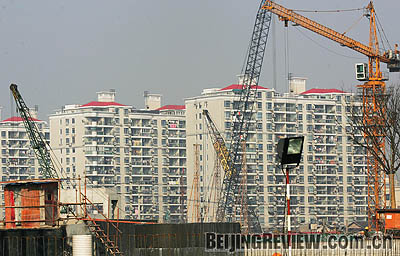|

REALTY CHECK: Real estate companies will have a harder time, as banks are to scrutinize their credit positions
PEI XIN
On April 11, the Shanghai Branch of the People's Bank of China, the country's central bank, issued an emergency document to eight banks in the city, requiring each of them to make a sample survey of 12 real estate development companies by April 15 so as to assist its investigation of the capital condition of estate developers.
According to a Xinhua report, the investigation includes three parts: basic conditions of real estate companies, their capital and financial status, and prices and sales conditions.
Questions the document points to are centered on the capital chains of real estate companies. For example, how high is the demand for bank loans, what are the most important capital sources of real estate developers, what has changed compared with the same period last year, and how many loans are repaid on schedule.
This indicates that the tight capital chains of real estate companies have attracted sufficient attention of the central bank. In the present loan structure of Chinese banks, loans to real estate companies are at a distinctly high level. At the end of last year, loans granted by all Chinese-funded commercial banks in Shanghai to real estate companies accounted for 32.2 percent of their total. Bank credit resources are more concentrated on the real estate industry, and banks are more dependent on real estate credit.
The Shanghai Bureau of the China Banking Regulatory Commission has indicated that fluctuations of property prices have jeopardized the safety of about half of the credit assets among banks in Shanghai.
At the same time, Chinese real estate industry is experiencing a severe winter in the spring of 2008. Owing to the tight money supply, many real estate companies are hoping to finance on the stock market. But both domestic and overseas investors are not optimistic about the pattern of just buying land-financing-development-buying land again. Therefore, very few estate companies got listed. On the other hand, while house prices have hit a record high, consumers' willingness to buy houses is declining significantly. According to statistics released by the Shanghai headquarters of the central bank for the first quarter of 2008, personal housing loans declined for the first time in 17 months. In March, personal housing loans granted by Chinese-funded commercial banks decreased 970 million yuan ($138.57 million), of which loans for newly built houses and second-hand houses decreased 750 million yuan ($107.14 million) and 220 million yuan ($31.43 million) respectively.
The blocked listing and stagnation of the real estate market have led to a sharp increase in bank loans of real estate companies. Take Poly Real Estate Group Co. Ltd., which is listed at Shanghai Stock Exchange, for an example. As one of the most powerful real estate companies in China, Poly borrowed 10.2 billion yuan ($1.46 billion) in bank loans last year, over 2.1 times of that borrowed in 2006. According to its 2007 annual report, the borrowings from financial institutions like banks and trust companies totaled 12.16 billion yuan ($1.74 billion), making up 43.33 percent of its total debts. Among the total, short-term loans and long-term loans due within one year accounted for 25.6 percent, meaning that Poly needs to repay more than 3.1 billion yuan ($442.86 million) this year.
However, according to the listing particulars, this year Poly plans to realize direct investment in real estate of 30-35 billion yuan ($4.29-5 billion) and sales revenues of 24 billion yuan ($3.43 billion). This means that the difference between its investment goals and sales revenue this year is 6 billion-11 billion yuan ($0.86 billion-1.57 billion). Together with the 3.1 billion yuan of due payment, Poly needs at least 9 billion yuan ($1.29 billion) this year to make up the gap.
In fact, almost all the estate companies have got into the crisis of capital chains in the same way as Poly. Large real estate developers such as Vanke, Gemdale and R&F all disclosed negative net cash flows per share in their 2007 annual reports. Therefore, when sounding out capital chains of estate companies, the Shanghai Branch of the central bank is also concerned about the accounts, sums due and extended payments to financial institutions by real estate companies, especially in the recent two quarters. Personal housing loans involved in loan litigations are also subject to the investigation this time.
Symptoms of risks have actually come out. According to a central bank report, by the end of last year, non-performing loans involved in housing development of Chinese-funded commercial banks in Shanghai had increased nearly 700 million yuan ($100 million) since the beginning of the year, with the ratio of non-performing loans rising by 0.78 percentage point. Of the total, newly incurred non-performing housing loans in 2007 hit 2 billion yuan ($285.71 million), a year-on-year increase of 1.3 billion yuan ($185.71 million).
According to a clerk of the credit department of Bank of China Beijing Branch, at present, the central bank has required all its branches to change the credit structure, gradually shrinking real estate loans and being cautions to agent loans. The central bank deems that since slow sales of real estate may threaten the safety of bank loans, real estate developers must lower housing prices to promote sales in order to prevent the loans from becoming non-performing ones, he continued.
According to the clerk, from April 28 onwards his bank would get more involved in real estate sales strategies, strictly requiring projects of slow sales to lower prices and never allowing default of loans. Bank clerks will be punished if loans they granted are defaulted.
"Real estate companies will have a harder and harder time," he said. | 